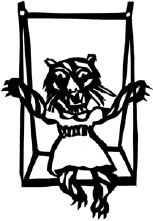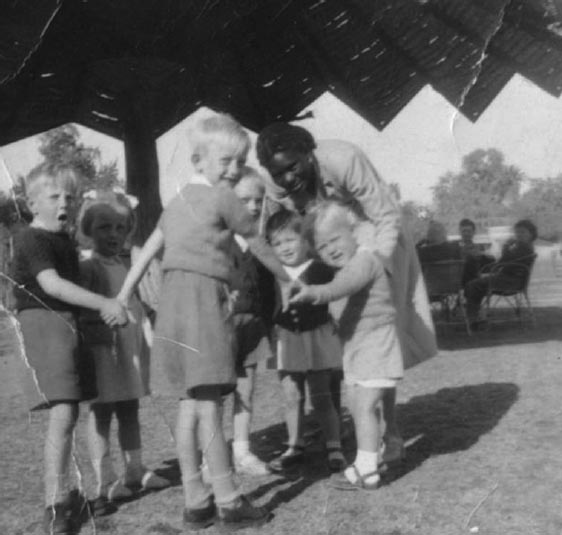
Early memory viii
‘Tiger’
One day, Daddy came back home, chortling. He’d been called in by the Gezira Sporting Club manager to discuss my behaviour. There had been a complaint from another parent: I’d bitten a boy because I wanted my turn on the swing and he wouldn’t get off. I remembered doing it – I still remember doing it. I had a favourite swing and every afternoon when I was taken by Nanny to Gezira Sporting Club, I’d swing on it, working it up higher and higher. Daddy had taught me both methods: sitting on the seat and stretching my legs out in front of me and hanging my head back till like a living pendulum the swing began to mount in the air. But this movement made me feel a bit sick if I misjudged the angle and dropped my head too far back and opened my eyes, and my stomach would begin to lurch; I preferred the other way, standing up between the ropes and flexing my knees while I hauled on the ropes with all my weight. I was impatient to get on the swing that afternoon, and I asked the boy who was occupying it for my turn, and he went on. I traipsed about in the playground. I may have had a go on the slide – I never liked slides as much because I was a girl who was always dressed up and the hot metal chute threatened to scrape my bare legs, and though I liked the little wooden merry-go-round which you could push round faster and faster with one foot and then jump on while it whirled, I wanted my go on the swing. I considered it my territory, I suppose, and he didn’t get off when he said he would, and wasn’t swinging properly, as I was able to rush at him and bite his arm and I wouldn’t have been able to do that if he had been flying. The rage that took hold of me is still vivid, and his howling as he ran away and I took over on the swing.
I wasn’t punished: Daddy howled with his kind of laughter then, and later, whenever he referred to the incident, shaking his head at the outrageousness of this behaviour, but not censoriously. ‘It shows spirit,’ he said. He nicknamed me ‘Tiger’ and wrote it on the back of a photo of me taken at Gezira, holding hands in a ring of blonde, no doubt peaceable children.
He didn’t know how to handle this child in his own image, and had no idea of discipline or punishment; he made me feel that if I had a temper, it was part and parcel of something else that made him and me close and separated me from my mother who never flared up in this vicious way, and found it, quite justifiably, very frightening, a curse on those who have it and on those who suffer its effects. I was myself bitten at school once, and I remember the ring of tooth-marks my attacker left on my arm: oddly neat and small, the imprint of a bracelet, with one place where she had broken the skin.

Marina (second child from right) with Nanny and friends. Gezira Sporting Club, 1949?
In the ‘Tiger’ photograph I’m with Nanny who is leaning over me; and now I come to a far more shameful episode than my biting a playmate. Many of the other children I played with in Gezira Sporting Club had white nannies from Trieste and the Balkans, who came to Egypt to earn enough to send back home and were known there as le alessandrine (the Alexandrians). For example, Claudia Roden, pre-eminent historian and chef, speaks Italian fluently after learning it as a child from her nanny, and she always acknowledges her debt to Italian cuisine and its cross-fertilising effects on Middle Eastern cooking.
I wanted a nanny like hers.
It is peculiarly horrible that I had learned such attitudes and was such a little tyrant that my mother and father produced another nanny. But the new one wasn’t Italian or Slovenian. Perhaps my father thought I should speak more English? She was Northern Irish, dressed in a uniform, with grey curls stuck stiff to her head. My Sudanese nanny wore her own clothes, which were soft when she picked me up and held me close to her, as was her flesh, her cheeks, her breasts and her lips. I was very unhappy with her replacement, and besides, she smelled of ‘perspiration’, as my mother always called sweat. It was caught in that starched uniform, under her arms and around her neck.
Nor did Daddy enjoy the new nanny’s certified ideas about decorum and discipline any more than I did, and she upset my mother’s fastidious sensitivities, as I say, and I was miserable, so again, I had my way and she went. She came and went so quickly that miraculously, Nanny was there again and remained until we left Cairo. At least this is how I remember that time: how I was so happy she was back and with her return I could lick again the delicious powdered sugar from my fingers after I’d picked out a bright cushion of lokum from the twist of paper in which she brought them back from the market.
But when I look in the photo album my mother kept, I realise once again memory plays tricks: this nanny who replaced the one from Britain was an Egyptian, perhaps from the city, not from the country, and she came when Laura, my sister, was on her way.
One morning she held me to the window of the nursery at the back of the flat.
‘Your new little sister’s just arrived over there,’ she said. She pointed out a long white building, the Anglo-American Hospital.
Soon afterwards we went to visit my mother: she was on her own in a huge bed in a huge room and was wearing something lacy and satiny and was surrounded by vases of flowers, like an effigy of a saint on her feast day. She was smiling, and happy; light flowed through the window. I was relieved she was alive.
Daddy then took me to another part of the hospital, below, and there were rows of cots in pink and blue, each one with a baby swaddled inside. I wondered how they knew which one was ours.
‘We put a label on them, silly,’ said the nurse, picking up Laura and showing me the ticket on her wrist, saying ‘Warner’; she had not yet been named.
I remember I was relieved, but not entirely convinced.
‘She came out long and thin like an Egyptian figure,’ Mummy would say. She was always superstitious and believed that her visits to the National Museum, where she’d pored over the crowded array of gods and goddesses in the museum’s halls, had had a profound effect on Laura.
I don’t know the name of the first or second nanny but under N in my father’s address book a name appears, Adriana Barakat, which means ‘blessing’.